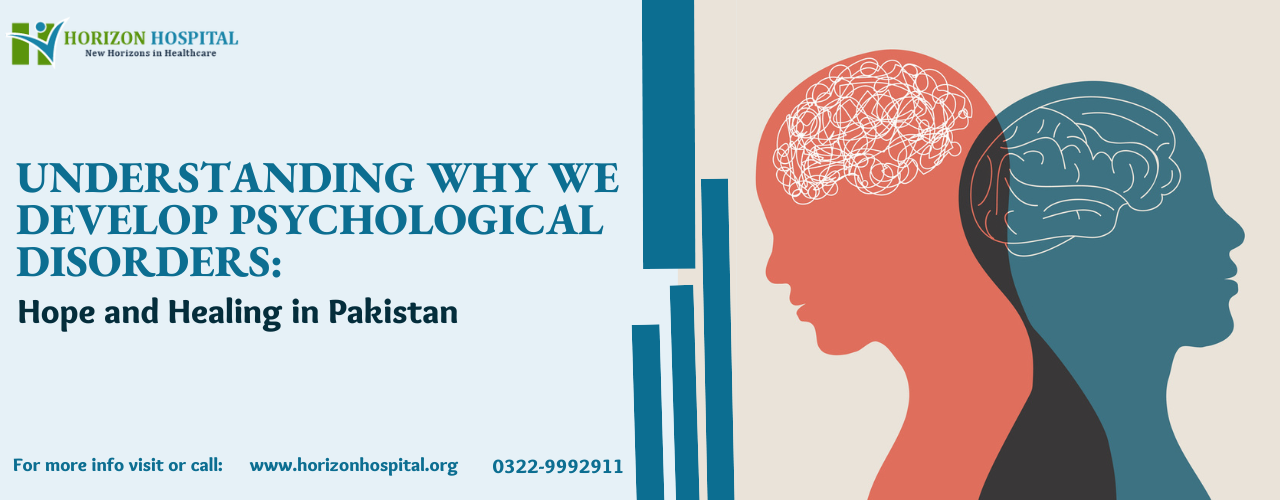
Understanding Why We Develop Psychological Disorders: Hope and Healing in Pakistan
Part- 2
Why Stigma Around Mental Health Hinders Recovery in Pakistan
In Pakistan, cultural and social stigma often surrounds mental health issues. This stigma can prevent individuals from seeking the help they need and can significantly hinder recovery. Some common misconceptions include:
⇒ Mental health problems are a sign of weakness. This misconception can make individuals ashamed to seek help, fearing judgment or ridicule. It’s important to remember that mental health problems are medical conditions, just like diabetes or heart disease. Seeking help is a sign of strength and a commitment to your well-being.
⇒ People with psychological disorders are violent. This stereotype is not only untrue but also harmful, as it can lead to social isolation and discrimination. People with mental health problems are more likely to be victims of violence than perpetrators.
⇒ Mental health issues cannot be treated. Fortunately, with advancements in therapy and medication, many psychological disorders can be effectively managed. Many people with mental health problems live fulfilling and productive lives with the proper treatment and support.
⇒ These misconceptions are simply untrue. Mental health problems are actual medical conditions, and effective treatments are available. Seeking professional help is a sign of strength and a commitment to your well-being.
How Our Hospital Can Help
Our hospital’s Department of Psychology offers a safe, supportive environment for individuals experiencing psychological problems. Our team of qualified and experienced psychologists provides a range of evidence-based treatments tailored to your specific needs. Here’s what
⇒ Individual therapy:
You’ll be assigned a psychologist to work with you one-on-one to develop coping mechanisms, address negative thought patterns, and improve your overall well-being. Different therapy approaches, such as cognitive-behavioral therapy (CBT) or interpersonal therapy, may be used.
⇒ Cognitive-behavioral therapy (CBT):
A form of treatment that helps identify and change negative thought patterns and behaviors that contribute to your psychological distress. CBT can be a very effective treatment for a variety of mental health disorders, including anxiety, depression, and phobias. You can learn to recognize and challenge negative thoughts, develop healthier coping mechanisms, and improve your emotional regulation skills through CBT.
⇒ Family therapy:
In some cases, family therapy may be recommended to involve your family members in the healing process. Family therapy can help improve communication, address family dynamics that may be contributing to your mental health problems, and provide a support system for your recovery.
Our psychologists are also trained in various evidence-based treatment approaches, including:
⇒ Dialectical behavior therapy (DBT): A specialized form of CBT that is effective in treating borderline personality disorder and other conditions characterized by emotional dysregulation.
⇒ Acceptance and commitment therapy (ACT): A therapy approach that helps individuals accept complex thoughts and feelings and commit to living a meaningful life according to their values.
⇒ Mindfulness-based therapy: Techniques that help cultivate present-moment awareness and acceptance, which can be beneficial for managing stress, anxiety, and depression.
In addition to therapy, medication may also be recommended as part of your treatment plan. A psychiatrist on our team can work with you to determine if medication is appropriate and prescribe the proper medication for your specific needs.
We understand the importance of cultural sensitivity in therapy. Our psychologists are trained to provide culturally competent care, respecting your values and beliefs while guiding you toward recovery.
Taking the First Step Towards Healing
If you’re struggling with a psychological disorder, you’re not alone. Millions of people in Pakistan and worldwide experience mental health challenges. The most crucial step is to seek help. Don’t let stigma or fear prevent you from getting the support you deserve.
Here are some tips to get started:
Talk to a trusted friend, family member, or religious leader. Talking to someone you trust can be an excellent first step in getting support.
Contact our hospital’s Department of Psychology to schedule an appointment. Our friendly staff can answer your questions and guide you through the process. We offer flexible scheduling options to accommodate your busy life.
Consider joining a support group. Connecting with others who understand what you’re going through can be a source of strength and encouragement. Support groups can be found online or in your community.
Remember, recovery is a journey, and there is no shame in seeking professional help. Our dedicated team at [Hospital Name] is here to support you on your path toward healing and well-being.
We offer flexible appointment options and financial assistance programs to ensure everyone can access quality mental healthcare. Don’t hesitate to reach out and take the first step towards a brighter future. By seeking help and taking charge of your mental health, you can live a more fulfilling and productive life.
Here are some additional things to keep in mind:
Being honest with your therapist about your symptoms and experiences is essential. The more information you provide, the better equipped they will be to help you.
Therapy takes time and effort. Keep going even if you don’t see results immediately. Be patient with yourself and trust the process.
Self-care is essential for mental health. Make sure to get enough sleep, eat a healthy diet, exercise regularly, and practice relaxation techniques like yoga or meditation.
Celebrate your successes, no matter how small. Taking care of your mental health is a journey of ups and downs. Acknowledge your progress and reward yourself for your efforts.
By taking these steps, you can overcome the challenges of a psychological disorder and live a happier, healthier life.
We at Horizon Hospital are committed to providing compassionate and effective mental healthcare for everyone in our community. Don’t wait any longer. Reach out today and start your journey towards healing.
